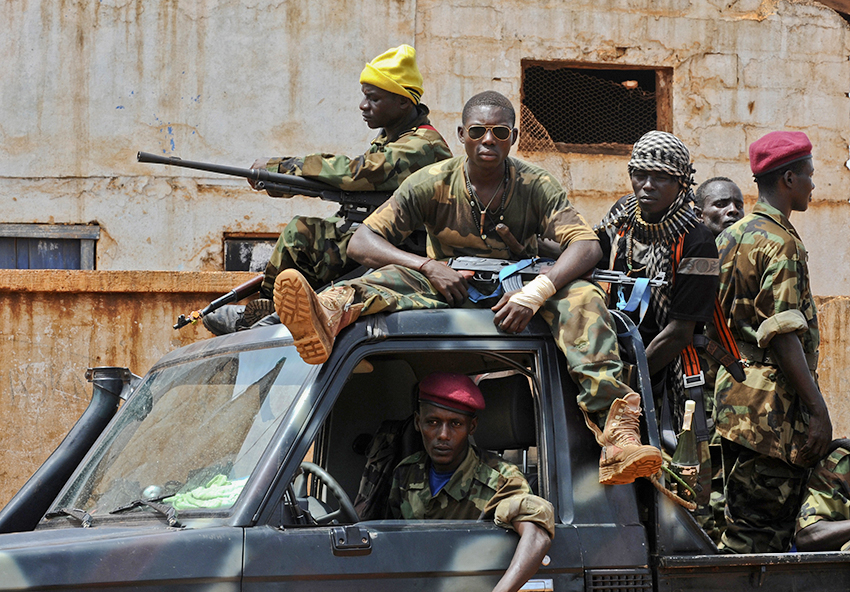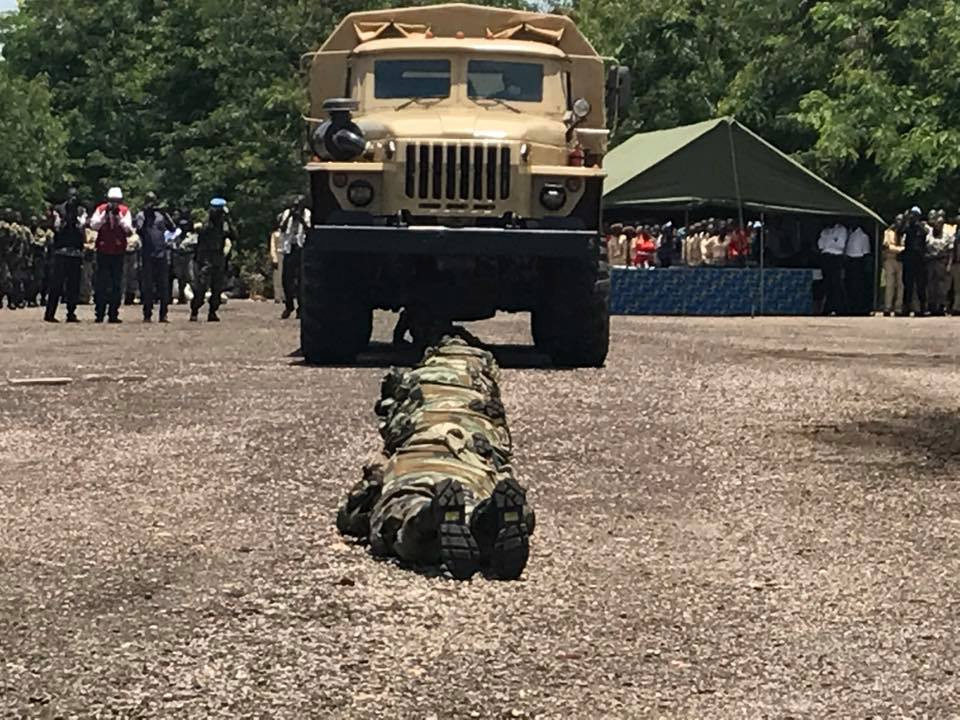

Orkhan Dzhemal, Alexander Rastorguyev and Kirill Radchenko died in the Central African Republic. Meanwhile, Russia is stealthily opening a new African front against the West – with the help of mercenaries.
On July 31, tragic news about the death of three Russian reporters in the Central African Republic (CAR) appeared. Military reporter Orkhan Dzhemal, film director Alexander Rastorguyev and cameraman Kirill Radchenko visited the country to make a documentary about Russia’s most secretive military gamble, i.e. mercenaries from the so-called Wagner PMC group who had been sent to the CAR, military instructors and a new front in Africa which is being opened by Moscow. The project was carried out by the Journalist Investigation Centre, a new initiative sponsored by Mikhail Khodorkovsky. It aims at exposing the Russian authorities’ dark and dirty campaigns and actions.
They were going from the city of Bangui to the town of Sibut, where they were to have met a local fixer. Earlier, they had failed to get to a mercenary training camp located near the capital. By that moment, they were identified and controlled by government soldiers. To work further, the journalists even paid bribes to the military. They were shot down at one of the savannah posts. For now, it is unknown who fired at them.
Death
Orkhan Dzhemal worked as a war correspondent at almost all the wars waged by Russia, and not just Russia. Seven years ago he was wounded in Libya. During the Russian-Georgian war, he entered Ossetia on one of the first APCs of the Chechen battalion Vostok. Many people criticized his book about that war. But later he came under fire of Kremlin propaganda for covering the war in Ukraine and blasting the Russian authorities. He was a journalists who had a good understanding of Caucasian affairs. He came from an Azeri family, and his father, Gaidar, was the head of the Islamic Committee, one of the Muslim organizations operating in Russia.
“If one looks for an archetypal, ‘movie’ figure of a war reporter, then Orchan was much the same,” Alexander Baunov, a friend and colleague of the killed journalist, said. “This is a huge loss for Russian journalism.”
Alexander Rastorguyev made fine documentaries about the Russian province. He often showed the life of his native Rostov-on-Don, its futility, grim blocks of flats and bored youngsters. In 2013, he presented his film I Do not Love You at the T-mobile Nowe Horyzonty festival in Wrocław. “Either I will be in to the army, or I will sweat my guts out for a few thousand rubles,” one of the characters of the documentary said. Rastorguyev tried to answer the questiont what spurs young Russians on to deviance, criminality and radical actions. Living in Rostov-on-Don, he was well aware of the events in the east of Ukraine. He protested against Russia’s hybrid actions in Donbas as well as the Kremlin’s electoral fraud.
CAR realities, photo by nan.ng
The issue of Russian mercenaries led him to Africa. But he still wanted to know what lures Russians into not-self wars. Is it just a desire for power and money? That was the main question that was supposed to be raised in the documentary filmed by the experienced cameraman Kirill Radchenko, hosted by the war journalist Orkhan Dzhemal and directed Alexander Rastorguyev, who knew the souls of simple young boys from the Russian province. But the project failed. Someone – accidentally or deliberately – thwarted the plans of three reporters. The topic of the Kremlin’s mercenaries in Africa are still a secret.
Russians in Africa
Moscow’s interest in Africa has been known about for a long time. The first information was the statement of the Russian Ministry of Foreign Affairs dated by March 22. It referred to the sending of small arms, ammunition, 5 military and 170 civilian instructors to the Central African Republic.
One can assume that these ‘civilian’ instructors are mercenaries from the Wagner group. They, mainly special forces soldiers, got the smell of powder Ukraine’s Donbas and Syria. Formally, they have no connection with the Russian authorities. They are led by Lieutenant Colonel Dmitry Utkin, who is also called Wagner because of his passion for the music by the German composer. Among others, the group is financed by St. Petersburg restaurateur and businessman Evgeny Prigozhin aka Kremlin’s Chef who is very close to the top echelons of the Russian power. In fact, mercenaries are pursuing Moscow’s interests in the places which it cannot officially send troops to.
Two days later, the agency France Press reported about a group of Russian instructors located 60 km of Bangui, the capital of the CAR. They were to set up a base in the former palace of the dictator Bokassa. The camp was also spotted via satellite.
Wagner group’s alleged instructors, photo by citeam.org.
Moreover, the Jeune Afrique weekly said that, according to the application for permission to export weapons submitted by Russia to the UN, the Russians sent 900 Makarov pistols, 5200 machine guns (probably AKM), 840 light machine guns, 140 sniper rifles, 270 grenade launchers and 20 portable anti-aircraft sets and ammunition to the Republic.
Later on, the photos featuring alleged Russian instructors as well as the latest Ural 4320 trucks were posted on the Internet (on the official profile of the president of the Central African Republic Faustin Archange Touadera). Such trucks had been previously seen on board a Turkish ship in Tunisia. The ship was engaged in cruises from Russian ports in the Black Sea to Syria. OSINT experts also reported about the registered flights of Rus Il-76 transpost planes from Mozdok (Russia) to Latakia (Syria) and then to Khartoum in Sudan and Bangui in the Central African Republic.
The Russian presence in the Central African Republic is undoubtedly much smaller than that in Syria. Its nature is also different. Officially, there are no Russian armed forces, but there is a group of mercenaries. However, even if Moscow is trying to camouflage its political interest in the chaos of the African country, it is clear that it is acting decisively, which is proved by the logistic organization of transporting weapons and equipment as well as sending a small group of mercenaries who must have already had a battle experience in Syria.
Why the Central African Republic? For almost two decades there has been a fratricidal civil war, bellum omnium contra omnes: the central government is against the two main alliances of the partisan opposition of Selek and Antibalak. In addition, there is a conflict between Christians and Muslims, struggles between ethnic groups and dozens of smaller groups and local militia, and sometimes ordinary gangs. In 2013, the United Nations recognized the Republic as a failed state. France did not succeed in establishing peace in Central Africa – in 2017, it withdrew its soldiers. Nor did military contingents of neighbours and other African countries (including the RSA). However, Moscow might have recognized that the republic is an excellent bridgehead for expansion in Africa. And there is a chance to earn money, which Russians do not conceal at all.
Wagner’s group trains Sudanese as well. Video by Alexander Kots
The above-mentioned same statement by Russia’s Foreign Ministry includes the following sentence: ‘looking into the possibility of joint exploitation of the natural resources of the country in cooperation with the government of the Central African Republic’ is allowed for. It is no coincidence that Russian instructors deployed their base not far from potential diamond, gold and uranium deposits. Apparently, the Russian side referred to their activity in Syria and promised certain help in regaining control over the entire country to president Faustin Touadera. Moscow counts on mining licenses in the future – but also at driving a wedge in the area of French interests in its former African colonies. The Russians are set to achieve their goals at a low cost. Sending several thousand rifles and almost two hundred mercenaries is a very low price (now, at the very least) for creating the impression that they are strengthening their influence in sub-Saharan Africa. It is a pity that the highest price for the Kremlin’s African adventure was paid by three reporters who just wanted to tell the world about it.
Michał Kacewicz, belsat.eu



